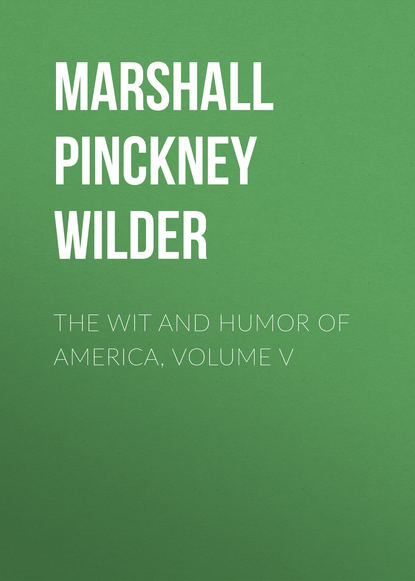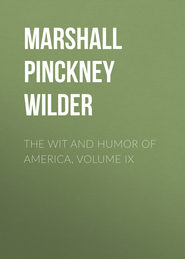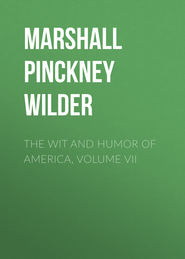По всем вопросам обращайтесь на: info@litportal.ru
(©) 2003-2024.
✖
The Wit and Humor of America, Volume V
Автор
Год написания книги
2019
Настройки чтения
Размер шрифта
Высота строк
Поля
Through all the worry and excitement the Widow was the only one who didn't show any special interest, except to ask for results. But finally, at the end of a week, when they'd strained the whole river through their drags and hadn't anything to show for it but a collection of tin cans and dead catfish, she threw a shawl over her head and went down the street to the cabin of Louisiana Clytemnestra, an old yellow woman, who would go into a trance for four bits and find a fortune for you for a dollar. I reckon she'd have called herself a clairvoyant nowadays, but then she was just a voodoo woman.
Well, the Widow said she reckoned that boys ought to be let out as well as in for half price, and so she laid down two bits, allowing that she wanted a few minutes' private conversation with her Bud. Clytie said she'd do her best, but that spirits were mighty snifty and high-toned, even when they'd only been poor white trash on earth, and it might make them mad to be called away from their high jinks if they were taking a little recreation, or from their high-priced New York customers if they were working, to tend to cut-rate business. Still, she'd have a try, and she did. But after having convulsions for half an hour, she gave it up. Reckoned that Bud was up to some cussedness off somewhere, and that he wouldn't answer for any two-bits.
The Widow was badly disappointed, but she allowed that that was just like Bud. He'd always been a boy that never could be found when any one wanted him. So she went off, saying that she'd had her money's worth in seeing Clytie throw those fancy fits. But next day she came again and paid down four bits, and Clytie reckoned that that ought to fetch Bud sure. Someways though, she didn't have any luck, and finally the Widow suggested that she call up Bud's father—Buck Williams had been dead a matter of ten years—and the old man responded promptly.
"Where's Bud?" asked the Widow.
Hadn't laid eyes on him. Didn't know he'd come across. Had he joined the church before he started?
"No."
Then he'd have to look downstairs for him.
Clytie told the Widow to call again and they'd get him sure. So she came back next day and laid down a dollar. That fetched old Buck Williams' ghost On the jump, you bet, but he said he hadn't laid eyes on Bud yet. They hauled the Sweet By and By with a drag net, but they couldn't get a rap from him. Clytie trotted out George Washington, and Napoleon, and Billy Patterson, and Ben Franklin, and Captain Kidd, just to show that there was no deception, but they couldn't get a whisper even from Bud.
I reckon Clytie had been stringing the old lady along, intending to produce Bud's spook as a sort of red-fire, calcium-light, grand-march-of-the-Amazons climax, but she didn't get a chance. For right there the old lady got up with a mighty set expression around her lips and marched out, muttering that it was just as she had thought all along—Bud wasn't there. And when the neighbors dropped in that afternoon to plan out a memorial service for her "lost lamb," she chased them off the lot with a broom. Said that they had looked in the river for him and that she had looked beyond the river for him, and that they would just stand pat now and wait for him to make the next move. Allowed that if she could once get her hands in "that lost lamb's" wool there might be an opening for a funeral when she got through with him, but there wouldn't be till then. Altogether, it looked as if there was a heap of trouble coming to Bud if he had made any mistake and was still alive.
The Widow found her "lost lamb" hiding behind a rain-barrel when she opened up the house next morning, and there was a mighty touching and affecting scene. In fact, the Widow must have touched him at least a hundred times and every time he was affected to tears, for she was using a bed slat, which is a powerfully strong moral agent for making a boy see the error of his ways. And it was a month after that before Bud could go down Main Street without some man who had called him a noble little fellow, or a bright, manly little chap, while he was drowned, reaching out and fetching him a clip on the ear for having come back and put the laugh on him.
No one except the Widow ever really got at the straight of Bud's conduct, but it appeared that he left home to get a few Indians scalps, and that he came back for a little bacon and corn pone.
I simply mention the Widow in passing as an example of the fact that the time to do your worrying is when a thing is all over, and that the way to do it is to leave it to the neighbors. I sail for home to-morrow.
Your affectionate father,
John Graham.
FAREWELL
Provoked by Calverley's "Forever"
By Bert Leston Taylor
"Farewell!" Another gloomy word
As ever into language crept.
'Tis often written, never heard,
Except
In playhouse. Ere the hero flits—
In handcuffs—from our pitying view.
"Farewell!" he murmurs, then exits
R.U.
"Farewell" is much too sighful for
An age that has not time to sigh.
We say, "I'll see you later," or
"Good-by!"
When, warned by chanticleer, you go
From her to whom you owe devoir,
"Say not 'good-by,'" she laughs, "but
'Au Revoir!'"
Thus from the garden are you sped;
And Juliet were the first to tell
You, you were silly if you said
"Farewell!"
"Farewell," meant long ago, before
It crept, tear-spattered, into song,
"Safe voyage!" "Pleasant journey!" or
"So long!"
But gone its cheery, old-time ring;
The poets made it rhyme with knell—
Joined it became a dismal thing—
"Farewell!"
"Farewell!" into the lover's soul
You see Fate plunge the fatal iron.
All poets use it. It's the whole
Of Byron.
"I only feel—farewell!" said he;
And always fearful was the telling—
Lord Byron was eternally
Farewelling.
"Farewell!" A dismal word, 'tis true
(And why not tell the truth about it!);
But what on earth would poets do
Without it?
MY RUTHERS
By James Whitcomb Riley
[Writ durin' State Fair at Indanoplis, whilse visitin' a Soninlaw then residin' thare, who has sence got back to the country whare he says a man that's raised thare ot to a-stayed in the first place.]
I tell you what I'd ruther do—
Ef I only had my ruthers,—
I'd ruther work when I wanted to
Than be bossed round by others;—
I'd ruther kindo' git the swing
O' what was needed, first, I jing!
Afore I swet at anything!—
Ef I only had my ruthers;—
In fact I'd aim to be the same
With all men as my brothers;








